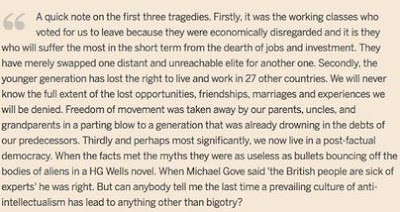When I saw the trailer for Me Before You, it looked like an obnoxiously typical romance movie.
Guy and girl meet, guy and girl disagree, guy and girl get over their
differences and fall in love. They either wind up together (cue big kiss, end
scene), or they realize their love just before one of them tragically dies (cue
Nicholas Sparks). Me Before You
looked like the former; it turns out to be the latter. But in this, the main
character kills himself via assisted suicide. Out of love.
I had no interest in the film to begin with, and I don’t
really care about how it ends. Lots of movies laud actions I disagree with. Plus
I hadn’t seen the movie or read the book, so that’s not really fair. But the
online response to Me Before You
fascinated me and gave me a bit of hope, which is not often found on the
internet.
The movie, its critics claim, reduces the main male
character down to his disability. Will has been injured. He’s angry and depressed.
He wants to die. And he thinks that by dying the woman he loves will have a
better life, thus making his suicide a romantic gesture. He asks his family to
let him kill himself and to be there for him while he does it; and they
begrudgingly agree. The movie romanticizes suicide; after all, he’s quadriplegic—who
would want to be him? How noble of him to end his life; now she can go out and
do other things.
The group Not Dead Yet has been protesting outside movie
theaters, raising awareness to how the film treats disability. Their posters
say: “Me Before You is not a romance.
It’s a disability snuff movie, giving audiences the message that if you’re a
disabled person, you’re better off dead.” The hashtag #MeBeforeEuthanasia
popped up condemning the movie’s portrayal of disability and approach to
assisted suicide.
Supporting assisted suicide is saying that it’s ok to want
to kill yourself if your situation is pitiful enough. It says that quality of
life is more important than life itself. If you aren’t a healthy, financially
stable person of the first world with a partner and friends than it’s perfectly
understandable to want to die. It says that not existing is preferable to a
life not perfectly controlled. Will had lots of money and medical care and a
supportive family, but that wasn’t good enough.
It reminds me of another movie, one I have actually seen
(and really like). In Gattaca,
society has valued being “perfect” to the point that anyone not genetically
enhanced is undesired and shut out from society. Vincent is conceived naturally,
not in a lab that selects preferred traits. He has a genetic disposition to
certain health problems, so in Gattaca’s
society, he’s “less-than”— it would be better if he didn’t exist at all. On the
other hand there is Jerome, the genetically-perfected man who, through an
accident, is injured and bound to a wheelchair. Despite all the planning and
control, Jerome has become “less-than” too, hiding away out of shame. In this
world, any deviation is a source of shame, a sign that you are “in-valid” and
that your life has no value.
It is revealed that Jerome’s accident was actually
self-inflicted. He was expected to be the best, so after coming in second at a
swimming match, he threw himself in front of a car. In the end, Jerome kills
himself in an incinerator. Jerome was haunted by the pressure to be perfect;
society had taught him that an imperfect life was not worth living. Even though
he was healthy and smart and willing to help others, it wasn’t enough. It wasn’t enough to convince him
that his existence had any value other than maximized utilitarian purposes.
Was Jerome to blame for his injuries and suicide? Yes and
no. He had control of his actions. He chose to end it all. But he was also
indoctrinated by a society that said those actions were alright. His life
wasn’t worth society’s effort to save it. He was suffering from shame and
depression, and there was no one there to offer hope or help. Similarly, Will
chose to die because society taught him that suicide was a reasonable option.
Instead of learning to live with a disability and seeking help for his depression,
he could just end it all, and society would find it sad but understandable,
maybe even romantic.
When people are suffering or going through tragedy, the
solution is not for the rest of us to indulge dangerous desires. The solution
is not to cast the hurt or suicidal away from our sanitized, perfect utopia of
healthy, happy people. The solution is to promote life, in all its forms, with
all its struggles. The solution is to hold on, to help, to befriend. Human life
is innately worthy. And so I was glad to see so many people upset about assisted
suicide speaking up. It gave me hope that we don’t live in a Gattaca world just yet, that perhaps the
dignity of life will trump the convenience of death.

















